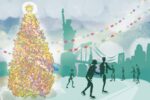In Ling Ma’s novel “Severance,” the protagonist hustles through the apocalypse. Candace Chen works at a publishing production firm in New York. She continues working there as her boyfriend leaves the city, as her co-workers leave the office, and even as the city itself crumbles under the weight of the Shen Fever global pandemic. Alone and immune to the disease, Candace moves to her Manhattan office. Only then does she realize that she is one of the few alive in the city, possibly the country. It’s at this point that she decides to leave.
Despite being published in 2018, “Severance” feels like a book of the current moment. Beyond the obvious similarities between the work of fiction and the actual COVID-19 pandemic, the book is a beautiful palimpsest. It combines elements of a horror novel, adds a twist to the leaving-New-York essay, and serves as a satirical piece on modern capitalism. Told in the voice of a witty, impenetrable narrator, Ma’s novel is familiar yet refreshing.
Much of the book’s appeal comes from Candace’s dry sense of humor and evocative observations. When talking about a visit to the province of Fuzhou, China, she recalls: “If Fuzhou Nighttime Feeling were a sound, it would be early/mid-nineties R&B. If it were a flavor, it would be the ice-cold Pepsi we drink as we turn down tiny alleyways where little kids defecate wildly. It is the feeling of drowning in a big hot open gutter, of crawling inside an undressed, unstanched wound that has never been cauterized.” Candace’s reflections on her experience as an immigrant from China to the United States are the emotional core of the book, and they move it beyond any neat genre classification.
Similarly, Candace is clear-eyed about the ways in which the internet snaked itself into the crevasses of modern life. A sex scene turns into a meditation on her boyfriend’s porn viewing habits; early in the novel, she acknowledges that her and other survivors of the apocalypse became “brand strategists and property lawyers and human resources specialists and personal finance consultants” who “didn’t know how to do anything so we Googled everything.”
Of course, the book’s sudden spike in popularity cannot be attributed solely to its individual merits. “Severance” earns the dubious honor of partially predicting the COVID-19 pandemic. Many of its segments so closely mirror events of the past year that the horror of the book does not come from the apocalypse it depicts, but from the ways in which this particular degree of catastrophe so closely passed by our societies. A hypothetical Shen Fever FAQ uses a a tone strongly reminiscent of the public health advertisements many of us grew familiar with in the past year. Conspiracy theories arise, and Candace herself becomes skeptical of the role of masks in preventing the spread of the illness (“If the masks actually work, don’t you think maybe there wouldn’t be an epidemic?”).
As Ma writes, “When you wake up in a fictitious world, your only frame of reference is fiction.” But the book is at its most illuminating when its reality departs from ours. COVID-19, like all illnesses, is a metaphor for nothing. Shen Fever, however, is a disease of repetition. Entire families become stuck in a perennial dinner ritual; old women boil the same pot of coffee until black smoke fills their apartments; retail employees fold and refold shirts even as half of their jaws are missing. In interviews, Ma has spoken about how the idea of Shen Fever came to her as she was “thinking about the nature of factory work (…) those repetitive motions, routines that are so bludgeoning.”
Candace, who is immune to the fever, stands in contrast to the infected — she takes no part in any repetitive actions. Instead, she chooses to maintain her routine out of her own will, even as the buildings around her empty out, the subway fills with residual water and electricity slowly cuts off every corner of New York. Ma once said that the animating question of the book was “Why does Candace Chen keep working at her job?” The question might seem like a difficult one to answer ourselves, but we can begin to understand an answer if we ask why so many of us kept on working during the pandemic — and why, as it was widely documented, many of us felt the need to turn a catastrophe into a surge of productivity.
For Candace, the desire to work — or to be, as her parents put it, “a person of use”— is deeply ingrained. As a child of immigrants who inherits their work ethic and as a subject of late capitalism, it seems as if Candace was born to work. As she says halfway through the book, “In this world, money is freedom. Opting out is not a real choice.” But it’s not all bleak; work gives Candace a purpose. After all, as Jiayang Fan wrote, work “is also a means of participating in a place, establishing a connection to it, and, gradually, becoming part of its ecosystem.”
Ultimately, Shen Fever simply represents the extreme conclusion of the adage “how you spend our days is how we spent our lives.” “Severance” offers no easy answers to society’s troubled relationship with routines and work, nor does it pretend that personal introspection will save society from global pandemics, climate collapse or the precarity of our economic systems. And yet, by disturbing the understandings of a normal relationship between work and individuals, the book prompts its readers to ask themselves how they can become people of use. But can they still maintain their humanity in the process?
















